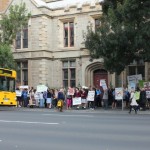
Will a new Tasmanian law against abortion clinic protests survive a High Court challenge? Michael Stokes of UTAS gives his view…but Prof Adrienne Stone disagrees, and CLA comments
Tasmanian abortion clinic protests ban may not be constitutional
By Michael Stokes, senior lecturer in Law, UTas
Tasmania’s abortion law reform bill, which passed late last week, decriminalises abortion and obligates medical practitioners with a conscientious objection to abortion to provide information about access to the procedure.
The law also restricts the right to protest within 150 metres of such a clinic. But such restrictions on freedom of political speech may not be constitutionally valid.
Protests against abortion are political communications and fall within the scope of the guarantee because abortion is a controversial political issue. To determine whether a law infringes the guarantee, the High Court asks two questions:
- Does the law effectively burden the freedom of political communication?
- If it does, does that burden disproportionately impact on the freedom when that impact is weighed against the legitimate aim of the law?
The Tasmanian provision prohibits “harassing, obstructing and intimidating” any person seeking access to an abortion clinic. It will probably be interpreted as being limited to behaviour which involves actual physical interference with a person seeking access to a clinic – or which amounts to a threat or intimidation. Some interference with the freedom of political communication is warranted to maintain peace and order in public places.
Despite the intention of the legislators, the clause may not be able to protect women from annoying, but non-threatening, verbal comments. The High Court has made it clear that the guarantees on political communication extend to protect insulting and abusive communications designed to cause anger or distress.
To avoid invalidity, the High Court may “read down” the provision (that is, interpret it as having a lower significance) to limit it to threatening and intimidating behaviour or to speech which is likely to provoke a violent response.
The second clause prohibits protests within 150 metres of an abortion clinic that are able to be seen or heard by a person accessing the clinic. The ban on such protests is total; it extends to protests on private land and to those which do not harass or intimidate and which are not offensive in any way. This is almost certainly invalid because of its interference with freedom of political communication.
The Tasmanian law is an effective deterrent – or burden – in that it prevents political communication on abortion in a certain area and prevents protesters targeting the audience they want to influence. The effectiveness of political speech is greatly reduced if we are prohibited from addressing a communication to the group whom we most want to influence.
The Second Reading Speech suggested that the prohibition was comparable to the prohibition of preaching, canvassing, haranguing, or distributing any printed matter without a permit recently upheld by the High Court. In that case, the permit system, which applied to broad classes of activity, was upheld on the grounds that it was for the legitimate purpose of regulating traffic in public streets.
But this clause can’t be justified on that basis because the areas in which the ban applies are not chosen for traffic-related reasons. Instead, it is because they surround an abortion clinic. Besides, it doesn’t apply to all demonstrations or protests – as would a traffic regulation – but only to those with respect to terminations.
Nor can the ban be explained as necessary to maintain peace and good order as it applies to all protests, not simply those which involve violence or threats or are likely to provoke violent retaliation.
It cannot be justified on the grounds that it is necessary to prevent women having abortions being vilified or stigmatised as it prevents all protests, not just those which vilify or stigmatise.
The Second Reading Speech justified the ban on the grounds that women accessing termination clinics have the right to be protected from expressions of disapproval and or abuse. That is not consistent with previous High Court rulings, which have made it clear that the freedom of political communication entails a freedom to use insult and the freedom to offend, as long as it does not cause gross offence.
The provision breaches the freedom of political communication and is therefore outside the powers of the parliament. To protect Tasmanian women seeking an abortion, the Tasmanian parliament should have prohibited protests that stigmatise or vilify.
We must now wait to see if the law is challenged in the High Court.
This article appeared first in The Conversation: http://tiny.cc/7tzd7w
For an alternative view, please see the article by Prof. Adrienne Stone, Director of the Centre for Comparative Constitutional Studies at U. Melbourne: http://tiny.cc/yvzd7w
CLA’s view on the law, as expressed on the ABC “PM” program: https://www.cla.asn.au/News/abortion-right-to-choose-and-protest/

